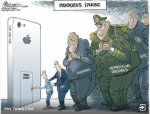trece verde
Well-Known Member
On a semi-related note. Regs, feel free to move to a new thread if you feel it's not close enough to the topic.
A question of philosophy...
What do you lot think? IMHO, the challenge here is not that it's not personal property - it belonged to his employer, but was obviously used personally - but that the ability to use the decryption technology would definitely be pushed beyond this case. I don't believe (and apparently neither does Apple) that the FBI would not use this technology again once they get it, which would render the encryption technology pointless. Who really needs encryption on a phone? Convince me you've never taken your cell phone to work...
A question of philosophy...
What do you lot think? IMHO, the challenge here is not that it's not personal property - it belonged to his employer, but was obviously used personally - but that the ability to use the decryption technology would definitely be pushed beyond this case. I don't believe (and apparently neither does Apple) that the FBI would not use this technology again once they get it, which would render the encryption technology pointless. Who really needs encryption on a phone? Convince me you've never taken your cell phone to work...
